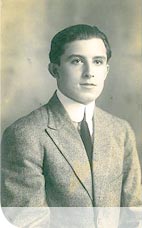4.1.1.7 Mariano Brull (1891 – 1956), purist aesthetics as poetics

Juan Marinello once said that Mariano Brull was the Cuban most gifted and inclined to pure poetry; he was the only one who remained faithful to this aesthetic creed from the publication of “Poemas en menguante” (Poems in the Waning Period) in 1928 and throughout his entire subsequent poetic career. In this sense, he was one of the bards who would take Cuban lyric poetry to its highest peaks, whose verses have resonated both on the island and worldwide.
Purity in poetry took two forms in Mariano Brull’s work, which nevertheless converged in many of his poetic pieces: the so-called fruitive, in which sensorial enjoyment is immanent, detached from all contingency and directed in its extreme towards the very sound of words, devoid of semantic content, as a way of “savouring” language itself.
An expression of this fruitive modality in its purely sonorous extreme, with a euphonic purpose, is jitanjáfora, a term used by Brull in one of his poems and coined by the Mexican writer Alfonso Reyes to refer to the aforementioned phenomenon of the “lexicon” devoid of meaning, not only as absurd but also as a result of his attempt to create a preconscious language, transmitting through its own onomatopoeic meaning.
The term was taken from the following verses from the poetry collection “Poemas en menguante” (Wanking Poems), from 1928:
“Filiflama alabe cundre
aliferous olalunea wing
alveolea jitanjáfora
“liris salumba salífera”
In addition to the fruitive mode, Mariano Brull’s work followed paths of intellectual inquiry, attempting to grasp and capture the essence of things through abstraction and to discover himself in the abandonment of his real, fleshly being. The purist attitude, taken to its ultimate consequences, leads to nothingness from a philosophical point of view and to silence in poetic matters, something Brull perhaps perceived at the very core of his quests, as illustrated by his poem “A toi – meme,” translated from French by Cintio Vitier:
“You who dive into the eternal
and you come back empty-handed,
full of a forgetfulness that only weighs
on eyelashes laden with dreams;
you who fill your life with nothing
to be lighter for the angel
who follows your steps with his eyes closed
and sees only through your eyes;
Have you found the body of Icarus?
in the shadow of your lost wings?
What has made you mute?
between the sands of nothingness,
to you who dive into the eternal
and you come back empty-handed?”
His work, despite the iterative nature of symbols and the fidelity to an aesthetic that ultimately determined a poetry without evolution – which is logical if one takes into account that from the author’s idealistic worldview, with a strong Neoplatonic imprint, the purest essences are alien to the uneven passage of time – the work of Mariano Brull presents a refined artistic style, associated with a musicality devoid of artifice, which is part of the best of Cuban poetry of all time.








